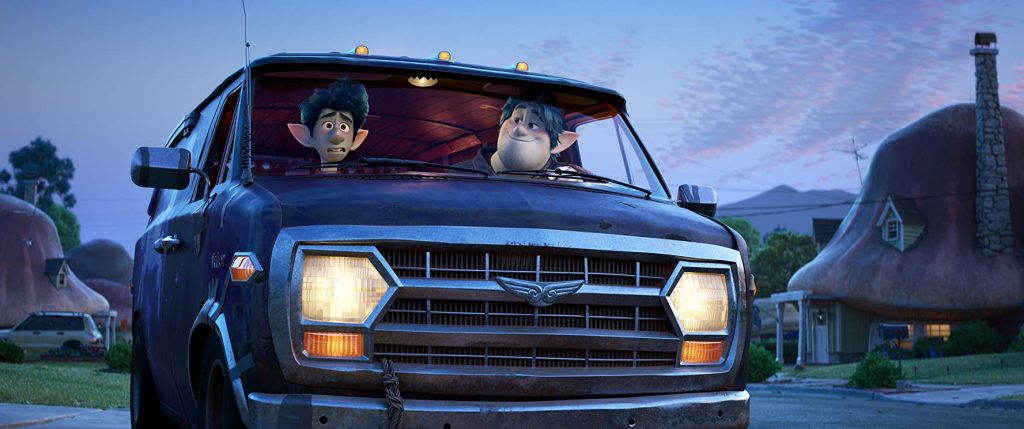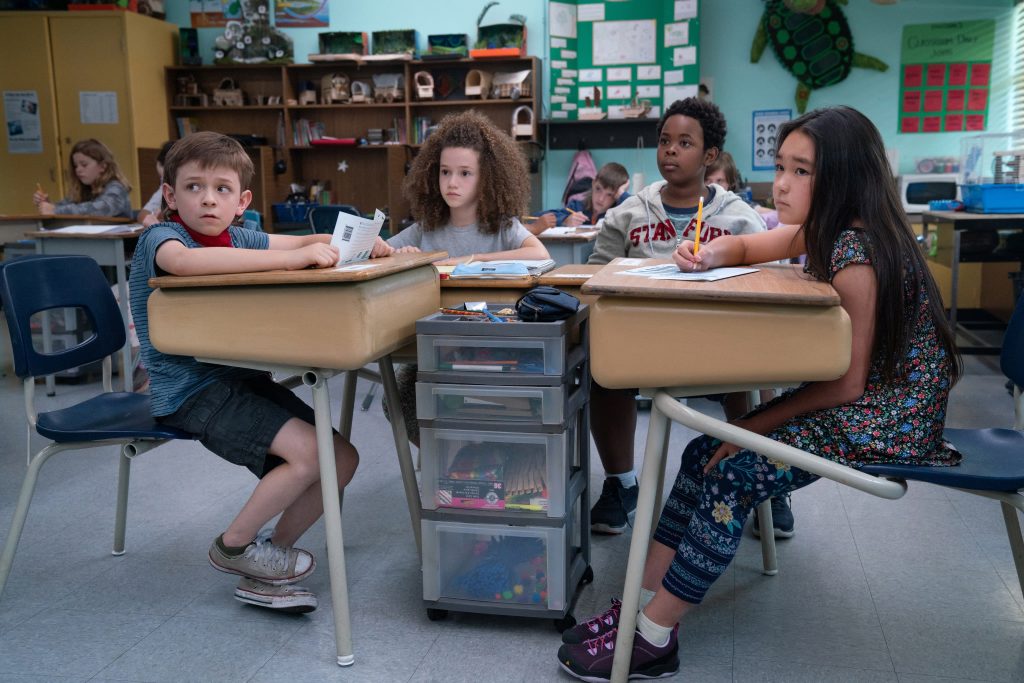March 6, 2020
by Carla Hay

Directed by Dan Scanlon
Culture Representation: Taking place in a magical world (where almost everyone has an American accent), the main characters of the animated film “Onward” are mythical creatures, but there are some human characters with minor supporting roles.
Culture Clash: A recurring theme in the movie is the conflicts between modern customs versus the magical customs.
Culture Audience: “Onward” is a family-friendly movie that will appeal to anyone who likes an adventurous and heart-warming story.

“Onward,” the first original film from Disney’s Pixar Animation Studios since 2017’s “Coco,” won’t be winning any Oscars as “Coco” did, but it’s a solid animated film that will be a crowd-pleaser for people of various generations. The movie (directed by Dan Scanlon who wrote the screenplay with Keith Bunin and Jason Headley) spends most of the film as a Pixar version of a video game. The story is simple and straightforward, involving the main characters doing a series of challenges to get to a coveted treasure item. It isn’t until the last 15 minutes that “Onward” packs an emotional punch that shows the movie is a little deeper than a typical animated film.
In the beginning of the movie, which is narrated by teenage elf Ian Lightfoot (voiced by Tom Holland), viewers learn that the world he lives in used to be filled with magic. But then modern technology took over, and magic became a antiquated custom that has been forgotten by numerous people in the world.
Ian lives with his kind and loving mother Laurel Lightfoot voiced by Julia-Louis Dreyfus) and his goofy older brother Barley Lightfoot (voiced by Chris Pratt). Laurel, who is a widow, has a “good guy” boyfriend named Colt Bronco (voiced by Mel Rodriguez), a centaur police officer. Ian and Barley’s father Wilden Lightfoot (voiced by Kyle Bornheimer) died when Ian was a bay and Barley was about three years old. Ian is about to turn 16, while Barley is 18 or 19. (His mother Laurel mentions that Barley is taking a “gap year.”)
Barley isn’t in school and he doesn’t seem to have a job, so he spends a lot of time at home being the kind of brother who often annoys Ian, who is studious and socially awkward. The two things that Barley is passionate about the most are his beat-up purple van that he’s named Guinevere and his encyclopedic knowledge of historical traditions in magic that hardly anyone around him seems to care about.
Barley also seems to be living in a “Bill & Ted’s Excellent Adventure”/”Wayne’s World” time warp, because he dresses and acts like a playful metalhead, just like those movies’ characters of Bill and Ted and Wayne and Garth. Guinevere is also decked out like something out of the late ’80s/ early ’90s, with the bumper stickers to prove it. Ian is often embarrassed by Barley, because he thinks of himself as intellectually superior to Barley, whose behavior is sometimes like a hyper puppy.
In one scene that shows the tension between the two brothers, Ian has worked up the nerve to ask some of his classmates to his upcoming 16th birthday party. He’s delighted when they say yes. But when Barley shows up at Ian’s school, he embarrasses Ian so much that Ian tells his classmates that the party has been cancelled. What Ian doesn’t tell his classmates is he doesn’t want them to be around Barley, who would be at the party.
For Ian’s birthday, he gets a wizard’s staff that his father Wilden had set aside for Ian to get specifically when Ian turned 16. He uses the staff to make a wish to bring his father back to life for 24 hours. But something goes wrong during the spell, and only the lower half of Wilden’s body (from the waist down) has come back to life. The upper half of his body exists but is invisible.
And so begins Ian and Barley’s race against time to find the magical item that will fully transform Wilden Lightfoot back to his normal self. The item that has the power to do that is a rare, mystical gem that’s hidden. For most of the film, Ian and Barley go off on a frantic quest to find the gem in time before their father disappears when the sun comes up. Just like a video game, they have to complete a challenge to get to the next level in the puzzle that will led them to the gem.
Along the way, they meet a lively group of characters, most notably the sassy Manticore (voiced by Octavia Spencer), also known as a restaurateur named Corey. She’s the owner of Manticore’s Tavern, where she has gone to reinvent herself as a “respectable” member of society after having a wild past. Ian and Barley also encounter a biker gang of pixies that clash with the two brothers.
Meanwhile, the story takes on a “Weekend at Bernie’s” vibe when Ian and Barley have to dress the upper half of their father’s body, including making him wear sunglasses, so that they can see him better. Ian and Barley lead him around by a leash-like belt that’s wrapped around his waist. At times it looks a little creepy, but it’s all played for laughs. In his half-body state, Wilden can’t see or talk, but apparently he can hear sometimes. It’s a plot hole that has to be overlooked in order to enjoy this movie.
The visual effects in “Onward” are perfectly fine and much better than most animated films. But compared to other Pixar movies (such as the Oscar-winning “Toy Story” movies, “Up,” “Finding Nemo,” “Inside Out” and “The Incredibles”), “Onward” is on the lower end of the quality scale. And although “Onward” covers a lot of the same ideas that other “race against time” fantasy/adventure stories have done before, near the end of the film, one of the brothers does something slightly unpredictable that affects how he feels about his family. It’s a tear-jerking moment that a lot of viewers won’t see coming. And it wouldn’t be a Pixar movie if there isn’t a scene that’s meant to make people cry.
Disney/Pixar Animation Studios released “Onward” in U.S. cinemas on March 6, 2020.
UPDATE: Because of the widespread coronavirus-related closures of movie theaters worldwide, Disney will make “Onward” available on digital and on Movies Anywhere, as of March 20, 2020, and on the Disney+ streaming service, as of April 3, 2020.


